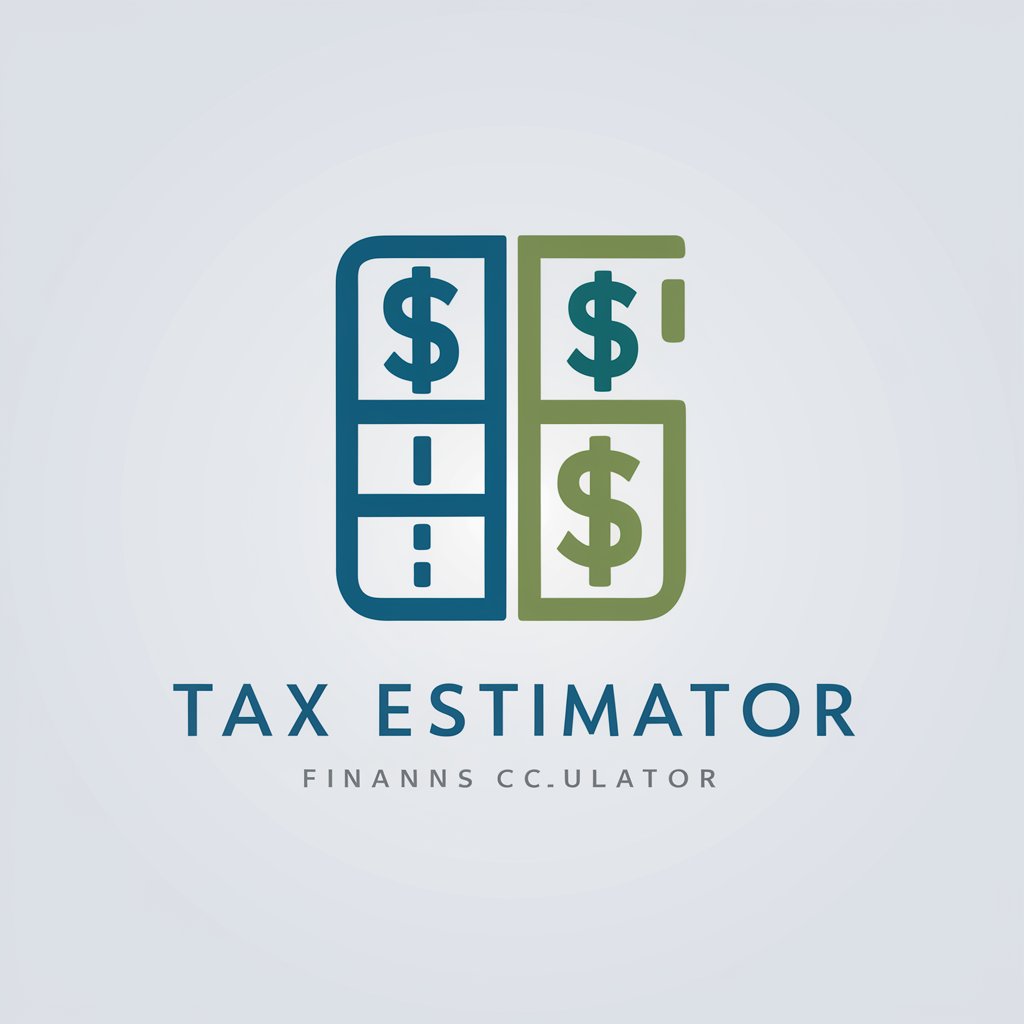Tax Estimator - Tax Analysis and Forecasting

Welcome to Tax Estimator! How can I assist you with your tax queries today?
Simplifying tax analysis with AI
Can you help me estimate my income tax for this year?
What are the potential tax implications of selling my property?
How can I minimize my tax liability for my small business?
What are the key differences between different tax deduction options?
Get Embed Code
Understanding Tax Estimator
Tax Estimator is designed as a sophisticated tool aimed at simplifying the complex world of taxation for individuals and businesses alike. Its core purpose is to provide users with estimations and analyses of various tax scenarios, helping them navigate the intricacies of tax obligations, deductions, and potential savings. Through the application of computational algorithms and adherence to current tax laws and guidelines, Tax Estimator offers insights into how different financial decisions can impact tax outcomes. For example, a user contemplating investment in rental property can use Tax Estimator to understand the potential tax implications, including deductions for mortgage interest, property taxes, and depreciation, as well as how these factors might affect their overall tax liability. Powered by ChatGPT-4o。

Core Functions of Tax Estimator
Income Tax Calculation
Example
For an individual earning a salary plus freelance income, Tax Estimator can calculate total taxable income, accounting for business expenses, and estimate the tax due, highlighting possible deductions.
Scenario
A freelancer looking to understand their tax burden and identify deductions to minimize tax liability.
Capital Gains Tax Analysis
Example
Tax Estimator analyzes short-term vs. long-term capital gains from stock investments, applying current tax rates to provide an estimate of the tax impact of selling assets.
Scenario
An investor deciding the optimal time to sell stocks to minimize capital gains tax.
Business Tax Planning
Example
For a small business owner, the tool can project the tax implications of business income, expenses, and potential tax credits, such as those for energy efficiency improvements.
Scenario
A small business owner planning for year-end tax obligations and seeking strategies to lower their tax bill.
Retirement Planning
Example
Estimates taxes on retirement account distributions, considering factors like age, account type (Roth vs. Traditional), and planned withdrawal amounts, to aid in retirement planning.
Scenario
An individual nearing retirement, evaluating the tax implications of different withdrawal strategies from their retirement accounts.
Who Benefits from Tax Estimator?
Freelancers and Independent Contractors
This group benefits from understanding their comprehensive tax obligations, including self-employment taxes and deductions, to optimize their tax situation.
Investors
Investors can use Tax Estimator to analyze the tax implications of investment decisions, including the timing of asset sales and understanding the impact of taxes on investment returns.
Small Business Owners
Small business owners can navigate the complexities of business taxes, including deductions, credits, and planning for quarterly tax payments, to ensure compliance and tax efficiency.
Retirees
Retirees benefit by estimating taxes on retirement distributions, helping them make informed decisions about withdrawal strategies to minimize their tax burden.

How to Use Tax Estimator
1. Begin Free Trial
Start by visiting yeschat.ai to access a free trial of Tax Estimator without the need for login or a ChatGPT Plus subscription.
2. Identify Your Tax Scenario
Consider the specific tax scenario or question you have, whether it's related to personal income tax, corporate taxation, or tax implications of investment decisions.
3. Gather Relevant Information
Collect all necessary financial documents and information relevant to your query, such as income statements, deduction details, and investment records.
4. Interact with Tax Estimator
Input your tax-related questions or scenarios into the Tax Estimator interface, providing as much detail as possible to ensure accuracy.
5. Review and Apply Insights
Carefully review the insights and calculations provided by Tax Estimator, and consider how they apply to your specific situation. For complex issues, seek professional advice.
Try other advanced and practical GPTs
Pattern Mathematician
Deciphering patterns, solving problems.

Quiz BLOG
Turn blog insights into interactive quizzes

Ai Driven Value Proposition Design
Craft Winning Value Propositions with AI

单词闪卡故事绘
Transforming Vocabulary Learning with AI-powered Stories

Brand Strategist
Empowering Your Brand with AI Insights

Monte Dictis
Decoding the Essence of Greek Elixirs

Side Effects
Empower Your Health with AI-Driven Side Effect Insights

Concepts for VSLs
Elevate Your VSLs with AI Power

Sale
AI-powered insights into the best deals.

Drone Analysis
Elevate Your Drone Insights with AI

Diet Manager
Tailoring your meals with AI precision

创业企划书
Empowering Startups with AI Insights

Frequently Asked Questions about Tax Estimator
What types of taxes can Tax Estimator handle?
Tax Estimator is equipped to analyze a wide range of tax scenarios, including personal income tax, corporate tax, capital gains tax, and VAT/GST among others.
How accurate is Tax Estimator?
While Tax Estimator strives to provide accurate estimates based on the information provided, users should note that actual tax liabilities may vary due to complex tax laws and individual circumstances.
Can Tax Estimator help with tax planning for future years?
Yes, Tax Estimator can assist in forecasting future tax obligations and planning by analyzing potential income, deductions, and tax-saving investments.
Is professional advice necessary if I use Tax Estimator?
Tax Estimator is a valuable tool for gaining insights into tax scenarios, but it is recommended to consult with a tax professional for personalized advice and legal tax planning.
Can Tax Estimator account for tax law changes?
Tax Estimator is updated to reflect recent tax law changes; however, users should stay informed about new tax legislation that may impact their specific situation.
